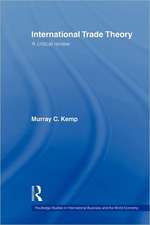The WTO and Infant Industry Promotion in Developing Countries: Perspectives on the Chinese Large Civil Aircraft: Routledge Research in International Economic Law
Autor Juan Heen Limba Engleză Paperback – 15 iul 2016
Juan He argues that the regulatory room prescribed by the multilateral trade rules of the WTO does not allow adequate space for developing countries to encourage new and technologically advanced areas of production and trade. The author concludes by suggesting ways in which WTO rules could be modified to help enable developing countries’ industrialization. In doing so, the book highlights a need to investigate how localized and international policy trends can be reconciled and enhanced towards the common goal of development.
The book will be of great interest to scholars and students of international trade law, Chinese studies, international political economy, and of great use to government agencies responsible for internal trade and industrial policy decisions.
| Toate formatele și edițiile | Preț | Express |
|---|---|---|
| Paperback (1) | 337.84 lei 6-8 săpt. | |
| Taylor & Francis – 15 iul 2016 | 337.84 lei 6-8 săpt. | |
| Hardback (1) | 821.79 lei 6-8 săpt. | |
| Taylor & Francis – 22 sep 2014 | 821.79 lei 6-8 săpt. |
Din seria Routledge Research in International Economic Law
-
 Preț: 278.61 lei
Preț: 278.61 lei -
 Preț: 355.31 lei
Preț: 355.31 lei -
 Preț: 342.99 lei
Preț: 342.99 lei -
 Preț: 309.79 lei
Preț: 309.79 lei -
 Preț: 410.07 lei
Preț: 410.07 lei -
 Preț: 389.38 lei
Preț: 389.38 lei - 18%
 Preț: 272.50 lei
Preț: 272.50 lei - 12%
 Preț: 313.61 lei
Preț: 313.61 lei - 18%
 Preț: 1010.26 lei
Preț: 1010.26 lei -
 Preț: 469.38 lei
Preț: 469.38 lei -
 Preț: 410.75 lei
Preț: 410.75 lei -
 Preț: 416.05 lei
Preț: 416.05 lei - 18%
 Preț: 1000.27 lei
Preț: 1000.27 lei - 13%
 Preț: 297.15 lei
Preț: 297.15 lei -
 Preț: 467.44 lei
Preț: 467.44 lei -
 Preț: 416.22 lei
Preț: 416.22 lei -
 Preț: 487.62 lei
Preț: 487.62 lei -
 Preț: 286.43 lei
Preț: 286.43 lei - 17%
 Preț: 259.98 lei
Preț: 259.98 lei - 26%
 Preț: 763.97 lei
Preț: 763.97 lei - 18%
 Preț: 1057.89 lei
Preț: 1057.89 lei - 18%
 Preț: 840.56 lei
Preț: 840.56 lei -
 Preț: 476.08 lei
Preț: 476.08 lei - 18%
 Preț: 1001.07 lei
Preț: 1001.07 lei -
 Preț: 453.88 lei
Preț: 453.88 lei - 9%
 Preț: 1005.12 lei
Preț: 1005.12 lei - 25%
 Preț: 545.58 lei
Preț: 545.58 lei -
 Preț: 416.22 lei
Preț: 416.22 lei - 18%
 Preț: 1000.27 lei
Preț: 1000.27 lei - 18%
 Preț: 1060.52 lei
Preț: 1060.52 lei - 18%
 Preț: 1061.06 lei
Preț: 1061.06 lei
Preț: 337.84 lei
Preț vechi: 394.13 lei
-14% Nou
Puncte Express: 507
Preț estimativ în valută:
64.64€ • 67.49$ • 53.50£
64.64€ • 67.49$ • 53.50£
Carte tipărită la comandă
Livrare economică 04-18 aprilie
Preluare comenzi: 021 569.72.76
Specificații
ISBN-13: 9781138212381
ISBN-10: 1138212385
Pagini: 304
Dimensiuni: 156 x 234 mm
Greutate: 0.43 kg
Ediția:1
Editura: Taylor & Francis
Colecția Routledge
Seria Routledge Research in International Economic Law
Locul publicării:Oxford, United Kingdom
ISBN-10: 1138212385
Pagini: 304
Dimensiuni: 156 x 234 mm
Greutate: 0.43 kg
Ediția:1
Editura: Taylor & Francis
Colecția Routledge
Seria Routledge Research in International Economic Law
Locul publicării:Oxford, United Kingdom
Public țintă
PostgraduateCuprins
1. Introduction Part 1: Infant industry promotion in the WTO context 2. Infant Industry Promotion and the WTO in Historical Perspective 3. Infant Industry Promotion and the Government Role in the WTO Part 2: Impact of multilateral trade agreements and evolving jurisprudence 4. GATT 1994: No Retreat to Import-Substituting Industrialization 5. SCM: Graduation from Ostensible Export Subsidization 6. TBT/SPS: Technical Barriers and the Standardization Strategy 7. TRIPS: Pursuing An Intellectual Property Right Law Balance Part 3: A contemporary challenge interacting with the WTO prospect 8. Putting Into Perspective: China’s Large Civil Aircraft Manufacturing and Trade 9. Contemporary Challenges for International Trade Regulation
Descriere
This book examines the novel challenge for developing countries to upgrade and optimize their industrial structure and trade composition by stimulating genuinely innovative and competitive industrial strength. The book specifically explores the issue of infant industry promotion under the legal framework of the WTO treaties and case law. Juan He argues that the regulatory room prescribed by the multilateral trade rules of the WTO does not allow adequate space for developing countries to encourage new and technologically advanced areas of production and trade, and suggests ways in which WTO rules could be modified to help enable developing countries’ industrialization.














